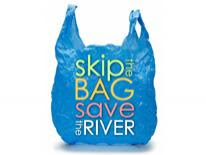 |
| Skip The Bag, Save The River |
The law requires all DC businesses that sell food or alcohol to charge five cents for each disposable paper or plastic carryout bag. In general the business retains one cent of tax, but can keep two cents if it offers a rebate to customers who bring their own bag. The remaining three to four cents goes to the Anacostia River Clean Up and Protection Fund. That money has gone to creating trash traps which has prevented 3 tons of garbage from entering the Anacostia River as well as other education and conservation projects.
The law took effect January 1, 2010 and a follow up study in 2013 found that 67% of residents reported seeing fewer plastic bags littering the area. 80% said they had reduced their use of disposable bags going from about 10 to 4 per week on average. 79% said they carry a reusable bag with them while shopping at least some of the time. It appears that in a relatively short period of time the bag tax had an impact on the number of plastic bags being used and the number of reusable bags being used.
I haven't lived anywhere that has had a bag tax, but I have lived in Hawaii when they passed their plastic bag ban and currently live in Florida which has a ban on plastic bag bans and taxes (why I started #skipthebag to begin with!).
Unfortunately if you read about the ban you will see there are several articles criticizing the law saying it is forcing people to get sick. They are claiming that the reusable bags become contaminated with e.coli and salmonella which results in food poisoning. Some of the articles want to repeal the law due to the risk of getting food poisoning. I do not doubt that there are some people who have fallen ill, I urge people to get educated on how to minimize the risk of food poisoning rather than to end a program that seems to be helping to make a positive difference.
Here are some suggestions on how to minimize your risk of getting food poisoning using a reusable bag:
- Use separate bags for vegetables and meat. Many times the bacteria is present on the meat and then is transferred to vegetables which may remain uncooked. Using produce bags for produce and other bags specifically for meat will help prevent this cross-contamination.
- Regularly wash your reusable bag. Your bag gets exposed to all sorts of potential contaminants. By washing it regularly you will help minimize potential for it to get on your food.
- Wash your hands regularly. Proper hand hygiene is always helpful in reducing the risk of food poisoning.
- Cook food to the appropriate temperatures. Cooking food helps kill the bacteria that causes food poisoning.


Hi Katy,
ReplyDeleteGood article and I love your tips for how not to get food poisoning when using reusable bags. I actually never thought much about that aspect of it but I just naturally washed my bags regularly or if they were the hard reusable plastic I sprayed out with peroxide and water bottle that I use for cleaning my things around my house. Shared on Twitter, pinned and googled.